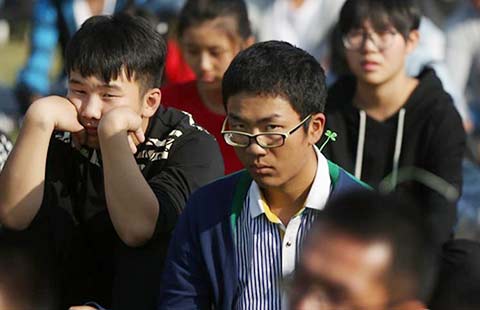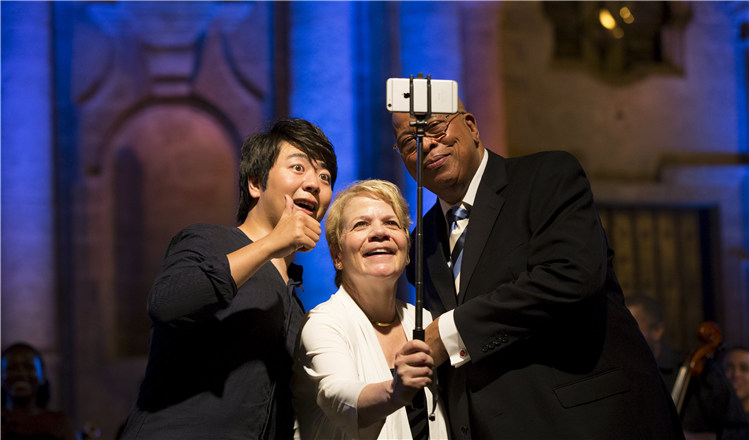The commoner people get their voice in print
Updated: 2015-10-14 07:40
By Yang Yang(China Daily)
|
||||||||
Much material is available on the horrors the common people of Shanghai faced since the Japanese military occupied the entire city on Dec 8, 1941, following the outbreak of the Pacific War. Many Chinese have learned of the pain the occupation inflected on their previous generations through literature, movies, TV series, memoirs and textbooks.
But a series of diaries by Shanghai resident Yan Bin, published recently, reveals some different sides of life during the conflict. My Life in Occupied Shanghai (1942-1945), presents his stories of work, study and romance, among other aspects of daily living, while even in the thick of fear and danger.
"I think life is multifaceted, which cannot be simply summarized by conceptions. But how to fully represent common people's life at such extraordinary times? The best way, I think, is to read material left by people going through those years, among which, diaries are the most precious," the dairies' editor, Wang Jincai, 54, says.
Wang studied history in college and now works at the general office of the Standing Committee of People's Congress of Shandong province. He still pursues his hobby of collecting historical material and personal diaries. About eight years ago, Wang bought Yan Bin's diaries at an online book fair.
Wang's collection of the Yan dairies include entires from 1942, 1944 and 1945, but accounts of 1943 are missing. He also got some letters and diaries of Yan kept after New China was founded in 1949.
He then started posting excerpts from the diaries online given their historical importance. Wang Ping, an editor at People's Publishing House, noticed them and decided to publish them in a printed format this year, as China celebrates the 70th anniversary of victory in the War of Resistance Against Japanese Aggression (1937-45).
Yan's accounts give readers glimpses into his daily life, his experiences, his opinions, his patriotism, his determination to fight against the Japanese aggression and the confidence that the Chinese would win. He also wrote about young Chinese who studied both the Chinese and English languages in their desire to serve the country better.
Some of Shanghai's youngsters at the time refused to get totally consumed by the war. They went on outings with friends, played mahjong, watched Chinese plays and movies, and started their own publications. They worked hard for a living and fell in love.
"The diaries can be seen as detailed portrayals of common people's life during those years in Shanghai. Anyone who wants to study the politics, economy, culture, art, folk customs, even history of pricing or weather (of the city) has to read this book," Wang Jincai says.
Yan, the diaries' writer, was born in Ningbo in East China's Zhejiang province, and lost his mother at an early age. His father remarried and Yan was raised by his grandmother. He finished six years of elementary education in his hometown before moving to Shanghai along with his sister after their father died in 1937.
After finishing middle school, he went to a local hardware store to be an apprentice. When he started writing his first diary on Jan 1, 1942, he was 19 years old.
The diaries show that even before Yan's father died, the family had become poor. Their houses and land had been mortgaged. The rough early years cultivated Yan to be an aspirational young man. He was diligent, made a lot of friends and spoke out against injustice.
Yan also suffered from an Oedipus complex, according to Wang Jincai. His mother had died when he was young.
Yan also spoke about his many relationships with young women.
As a young man in the middle of an ongoing war, Yan also described the hard life back then: how prices of goods rose quickly, how homeless people suffered starvation. Many times, he expressed the shame that he could not fight and die in the frontline like some of his friends did. But he was happy to earn a living.
On one hand, Yan wrote he despised graft within the Kuomintang system and on the other, the despotism and incompetence of the times made him suspicious of the communists, according to Wang. As a result, instead of joining the revolution like some of his classmates, he started a business after 1946, and indulged in drinking and playing mahjong.
Although the book ends in 1945, Yan's diaries went on for years after. Wang has attached fragments of Yan's writings from 1946-64 in the appendix of the book.
"After 1946, Yan kept the diaries only on and off. Because the occupation had ended, I just cited some important parts to tell readers the changes of his fate, getting married and having children, in case they worried (what happened to him)," Wang says.
Wang tried to contact the writer of the diaries, but there is no clue whether Yan is still alive or not.
yangyangs@chinadaily.com.cn
(China Daily 10/14/2015 page20)
Most Viewed
Editor's Picks

|

|

|

|

|

|
Today's Top News
Tu first Chinese to win Nobel Prize in Medicine
Huntsman says Sino-US relationship needs common goals
Xi pledges $2 billion to help developing countries
Young people from US look forward to Xi's state visit: Survey
US to accept more refugees than planned
Li calls on State-owned firms to tap more global markets
Apple's iOS App Store suffers first major attack
Japan enacts new security laws to overturn postwar pacifism
US Weekly

|

|















